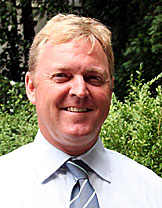If it were up to Scott Steinmetz, all the roofs in sunny California would already be covered with photovoltaic panels. "Where else if not here," says Steinmetz, who's in charge of Natural Catastrophe Management at Fireman's Fund. In this capacity he is directly concerned with the effects of climate change. "The related risks have an immediate impact on our business fields," says Steinmetz, who holds a Master's degree in Civil and Environmental Engineering.
"A stabilizing force"
But apparently the effects of climate change aren't dramatic enough yet: it is still being discussed in politically influential circles in the U.S. whether climate change is actually happening. Steinmetz believes the insurance industry can play an important role in clarifying this matter: "Evidence is growing stronger and stronger. It's our duty to raise awareness of the inherent dangers and foster a sense of responsibility for next generations. There have already been some encouraging developments."

An important role in society
Developments to which Fireman's Fund has contributed: in 2006 the company, which is based in Novato, California, pioneered green insurance policies for commercial properties in the US which are constructed in accordance with ecological standards. The concept was expanded this summer to include private properties. Ecohouse owners are granted a five percent discount on their premiums. Following a claim, owners of conventional homes are offered the option to ecologically upgrade their house, for example, by installing efficient insulation or energy-saving appliances. If a property is completely destroyed by fire, for instance, the policy will cover the rebuilding according to the eco-guidelines laid down by the US Green Building Council, an organization that promotes the construction of environmentally friendly, energy-efficient buildings in America.
In the meantime, Fireman's Fund's Commercial Division has also developed other green policies: commercial vehicle replacement policies include a "hybrid upgrade endorsement" that allows damaged, stolen or destroyed cars to be replaced with hybrid vehicles – cars which can run on gas or alternatively derived eco fuels – and there's also eco-insurance available for companies that use particularly environmentally friendly production processes and reduce their water and energy consumption. This is just the beginning as far as Steinmetz is concerned. He believes that the insurance industry should be playing a much more active part. "We have an important role to play in society," he says. "As a stabilizing force we could make much better use of our knowledge and expertise in public debates on land use and city planning, for example."
"Horribly under-funded"
He's already set an example: as the sole representative from the insurance industry, he is part of a state panel that's drawing up building guidelines for developments on alluvial fans, flood-endangered areas near California's mountain rivers. This was prompted by a flood disaster in San Bernardino that claimed the lives of 16 people in December 2003. Following heavy rainfall, a river swelled to a raging torrent, taking a group of people at the exit of the Waterman Canyon by surprise. The disaster highlighted once again the risks that buildings in the catch-basins of mountain valleys are exposed to.
These areas are highly prized by developers for their riverside location with mountain views, and by farmers for their fertile soil. "This is about land usage that takes potential flood risks into account," says Steinmetz. "Despite the flooding in New Orleans following Hurricane Katrina in 2005 and other incidences of tornado/hurricane induced flooding, most of the US is still very unfamiliar with flood-risks – and most are horribly under-funded." It's not a question of no longer building in these zones, say risk experts. But developments have to be well designed with protective measures in place in the event of flash floods. This aspect has been neglected in the past.
This article first appeared in the employee magazine "Allianz Journal".
As with all content published on this site, these statements are subject to our Forward-Looking Statement disclaimer, provided on the right.